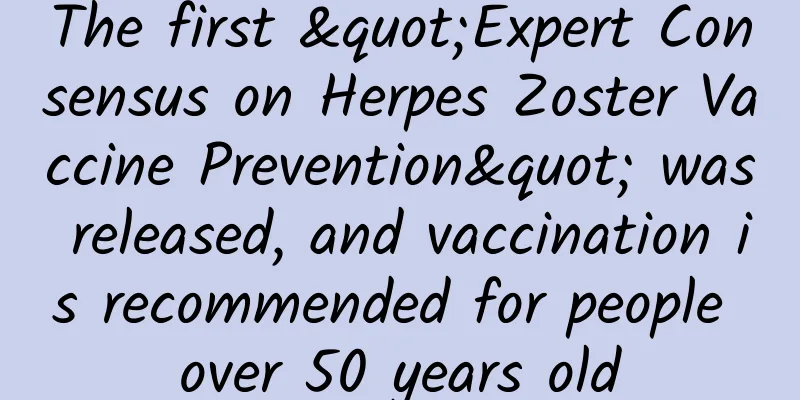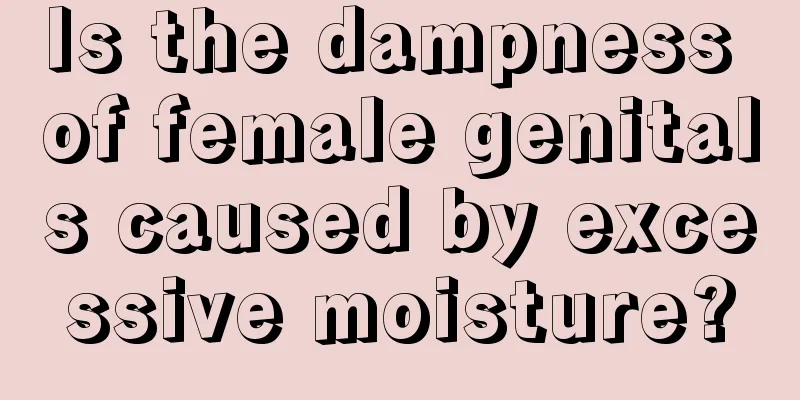The first "Expert Consensus on Herpes Zoster Vaccine Prevention" was released, and vaccination is recommended for people over 50 years old

|
Recently, the "Chinese Medical Journal" published my country's first "Expert Consensus on Herpes Zoster Vaccine Immunization" (hereinafter referred to as the "Consensus"), which clearly recommends that people aged 50 and above with normal immune function be vaccinated with shingles vaccine. Shingles, also known as "herpes zoster", is common in middle-aged and elderly people. The pain is unbearable during an attack, which can be burning, electric shock, knife-like, needle-like or tearing. The pain can be mainly of one nature, or multiple natures can coexist. The "Consensus" points out that the current treatment of herpes zoster is mainly antiviral and symptomatic treatment. There is no specific medicine, and vaccination is the most effective and feasible means of prevention. So, how do we correctly understand herpes zoster and how do we get vaccinated? Correctly understand and get out of misunderstanding Myth 1: Shingles is not contagious! The blister fluid of patients contains infectious virus particles, which can cause chickenpox in susceptible people, but it does not directly cause shingles. Therefore, shingles is contagious, but less contagious than chickenpox. Myth 2: Once you’ve had shingles, you’ll be immune for life! After the patient recovers, it is impossible to prevent the virus from being reactivated at the root and he or she still faces the possibility of relapse again or multiple times. Myth 3: You only get shingles when you’re older. Children, young people, and middle-aged people can also get the disease, although it is relatively rare. The incidence of herpes zoster increases with age, and the incidence rate increases significantly after the age of 50. Myth 4: If you’ve had chickenpox, you won’t get shingles. On the contrary, people who have had chickenpox are at high risk of developing shingles. Chickenpox and shingles are brothers, both of which are diseases caused by VZV infection. The initial infection mainly occurs in early childhood and can cause chickenpox or invisible infection. After the infection is controlled, some of the more cunning viruses will lurk and wait for the opportunity to "rise up in rebellion", which will cause shingles. Vaccination is effective in preventing Vaccination is the most effective and feasible measure to prevent shingles. Currently, there are two shingles vaccines available worldwide, namely, the live attenuated shingles vaccine (ZVL) and the recombinant shingles vaccine (RZV). ZVL has not been approved in mainland my country, while the RZV developed by GlaxoSmithKline was approved for marketing in my country in May 2019, becoming the only approved shingles vaccine in China. Q1: Who are the suitable people for the recombinant shingles vaccine? Different countries recommend different vaccination populations. Currently, my country has approved its use for the prevention of shingles in adults aged 50 and above, but it cannot be used to prevent primary varicella. Q2: What is the protective efficacy of the recombinant shingles vaccine? The protection rate is high, with a protective efficacy of 97.2% in subjects aged ≥ 50 years. Q3: How long can the protective efficacy of the recombinant shingles vaccine last? The protective efficacy of the vaccine did not decline significantly within 4 years. Due to the short time on the market, the exact time remains to be studied. Q4: Is the recombinant shingles vaccine safe? What are the adverse reactions after vaccination? Adverse reactions are relatively mild, and the most common local adverse reactions include pain, erythema and swelling at the injection site. Systemic adverse reactions include myalgia, fatigue, headache, chills, fever and gastrointestinal symptoms. The incidence of serious adverse reactions is very low, and the safety is generally good. Q5: If you have had shingles, is it necessary to get the recombinant shingles vaccine? Because shingles can recur, it is recommended that people who have had shingles in the past receive a recombinant shingles vaccine. Q6: If I have received the varicella vaccine or have had varicella, do I still need to receive the recombinant shingles vaccine? Whether or not you have received the varicella vaccine, you can get the recombinant herpes zoster vaccine. People who have had varicella are at high risk of developing herpes zoster and should be vaccinated with the recombinant herpes zoster vaccine. Q7: Will I get shingles after getting the recombinant shingles vaccine? No, it is a recombinant vaccine, not a whole virus. Q8: Can varicella vaccine be used to prevent shingles? At present, the varicella vaccine in my country is approved for the prevention of varicella, but not for the prevention of herpes zoster. The varicella vaccine and the herpes zoster live attenuated vaccine contain the same attenuated live virus, the difference lies in the number of viral plaque-forming units per dose of the vaccine and the injection dose. There are a few things to keep in mind when getting the shingles vaccine: 1 Patients with common diseases such as hypertension, dyslipidemia, diabetes, coronary heart disease, asthma, respiratory diseases, kidney diseases, etc. and people with weakened immune function can be vaccinated with recombinant shingles vaccine. 2 Pregnant and breastfeeding women should avoid vaccination as there is currently no research data. 3. People who are allergic to the active ingredients or any excipients of the vaccine are prohibited from using the vaccine. 4 Vaccination should not be given during an acute episode of herpes zoster. 5 Vaccination should be delayed for patients with acute symptoms. |
<<: Know more about medicine | Why do you need to stop taking warfarin before doing a gastroscopy?
>>: Know a little about medicine | How to avoid pain when injecting insulin subcutaneously?
Recommend
Nine reasons why women have itchy lower body, check it out
Many women in life will have the problem of itchi...
How to cure labia itching
Labia itching is a common condition in the female...
What to do if a female urethral cyst
Ovarian cysts are a gynecological disease that th...
What fruits can't be eaten if the uterus is cold
There are many female diseases in the female body...
How to relieve stomach pain when girls have their period
During menstruation, many women will experience d...
Does the stomach really get bigger the more you eat and smaller the hungrier you get?
Question from a netizen: I often hear the saying ...
Why can’t I see the ovaries on ultrasound?
Women's ovaries are very important reproducti...
Yellow-green purulent leucorrhea
Normally, the secretion is milky white or colorle...
What if I don't have my period for a month after a miscarriage?
Many women are not used to wearing condoms or oth...
What are the complications of uterine prolapse?
Most women will experience uterine prolapse after...
List of "Science" Rumors in June 2024: Can you take antipyretics to reduce the temperature when you have a heat stroke? Are foods safer with a shorter shelf life?
The list of "scientific" rumors for Jun...
The harm of laser freckle removal, be careful after reading this
In order to remove spots on the face, people woul...









